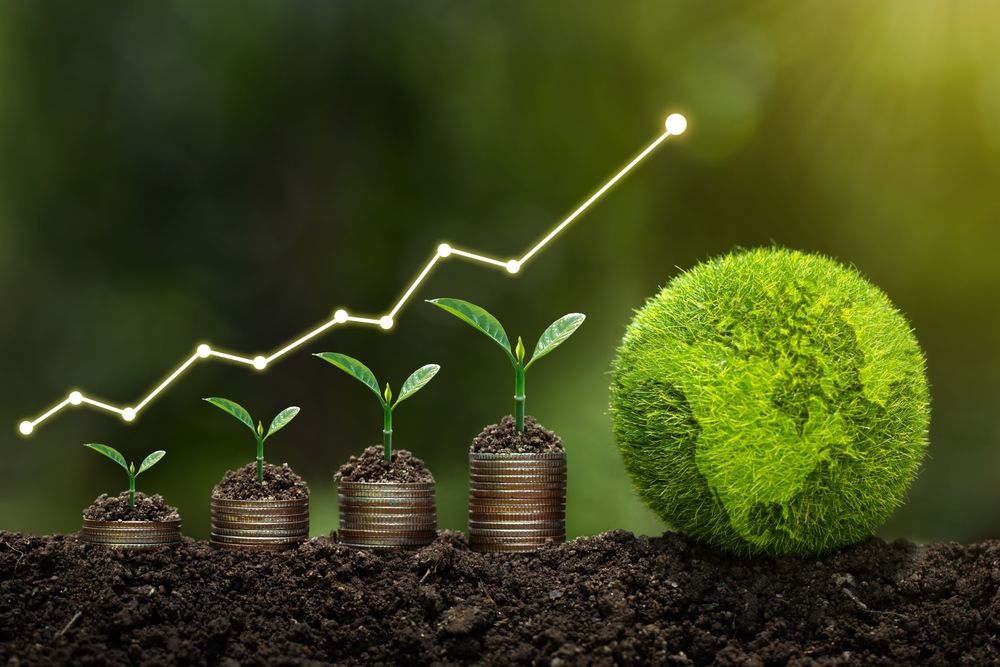
As the world becomes increasingly aware of the environmental challenges we face, the concept of eco-investments has taken center stage. It’s not just about making ethical choices; it’s about recognizing the vast potential for profit in the burgeoning green economy. Eco-investments provide a pathway to combine the desire for a healthier planet with the pursuit of financial gain. In this article, we dive into the world of eco-investments to understand how going green can indeed mean making money.
The Rise of Green Markets
The green market is expanding at an unprecedented pace, driven by a combination of consumer demand, technological innovation, and supportive government policies. As a result, a plethora of investment opportunities has emerged. From renewable energy sources like solar and wind to sustainable agriculture and green building materials, the market is ripe with potential.
Renewable energy is the poster child for green investments. Solar panels and wind turbines are becoming more efficient and cost-effective, leading to higher adoption rates around the world. Investments in these technologies not only support a transition to a cleaner energy grid but also promise substantial returns as the sector grows.
Sustainable agriculture is another area witnessing significant growth. As the global population rises and resources become scarcer, investing in technologies and practices that increase food production efficiency while reducing environmental impact can be particularly lucrative. Companies that focus on organic farming, vertical farming, and aquaponics are gaining attention from investors who see the long-term value in sustainable food production.
Green building materials are also on the rise. As more builders and homeowners look for ways to reduce their carbon footprint, materials like bamboo, recycled steel, and low-VOC paints are becoming the materials of choice. Investing in these materials or the companies that produce them can be a smart move, aligning investor portfolios with the future of construction.
Eco-Investing in the Stock Market
The stock market offers a straightforward avenue for investors to dip their toes into the green investment pool. Many publicly traded companies are involved in environmental technology, renewable energy, and sustainable practices. By choosing stocks wisely, investors can align their portfolios with their environmental values.
Green-focused exchange-traded funds (ETFs) and mutual funds are an excellent way for individuals to gain diversified exposure to eco-investments. These funds often consist of a variety of companies operating in the green sector, providing a balance of risk and return. Some funds specifically target clean energy, water conservation, or other sustainability themes, allowing investors to focus on particular areas of interest.
Investing in individual companies that have a strong commitment to sustainability is another approach. These companies might not be exclusively focused on green products or services but integrate sustainable practices into their operations. By supporting companies with robust environmental policies, investors can encourage wider corporate responsibility while potentially earning healthy returns.
Impact Investing and Community Projects
Impact investing is a more targeted approach to eco-investing, where the primary goal is to generate a positive social or environmental impact along with a financial return. This often involves investing in projects or companies that are directly addressing environmental challenges such as clean water access, renewable energy implementation, or waste reduction.
Community projects can also be a rewarding investment opportunity. These might include local solar or wind farms, community gardens, or green infrastructure projects. By investing in these initiatives, individuals can see the tangible results of their contributions while fostering sustainable development and often receiving a financial return.
Green bonds are another instrument gaining popularity in impact investing, with proceeds explicitly earmarked for financing environmentally friendly projects. Issued by governments, municipalities, and corporations, these bonds can provide a stable income stream and the satisfaction of contributing to positive environmental outcomes.
Sustainable Real Estate and Green Buildings
Real estate is another significant area for eco-investments. Investing in properties with high energy efficiency, sustainable materials, and green certifications such as LEED (Leadership in Energy and Environmental Design) can lead to cost savings, higher property values, and appeal to environmentally conscious tenants or buyers.
Green buildings reduce carbon footprints by utilizing renewable energy sources and incorporating energy-efficient designs. As regulations become stricter and energy prices rise, these buildings are likely to become the standard, making them a wise investment choice today. Additionally, retrofitting existing buildings with green technologies can increase their value and attract a new market of eco-conscious occupants.
Investors can also look into real estate investment trusts (REITs) that specialize in sustainable properties. These trusts provide a way to invest in green real estate without the need for direct property ownership, offering liquidity and diversification benefits.
The Future of Eco-Investments
The future looks bright for eco-investments as global awareness and action towards environmental sustainability continue to grow. As we witness a societal shift towards a green economy, the opportunities for profitable investments in the sector will likely expand.
Technological advancements are set to play a key role in the future of eco-investments. Innovations in battery storage, electric vehicles, and smart grid technology are just a few areas where significant progress is being made, offering new investment prospects.
Governments around the world are also stepping up their support for green initiatives. Subsidies, tax incentives, and regulations favoring sustainable practices all contribute to an investment environment that rewards eco-friendly choices.
Eco-investments represent a dynamic and promising field for those looking to align their financial goals with their environmental values. Whether through the stock market, impact investing, sustainable real estate, or emerging green technologies, opportunities to make money by going green are abundant and growing. As we collectively move towards a more sustainable future, eco-investments not only offer the potential for financial returns but also the chance to be part of the solution to our planet’s environmental challenges.
